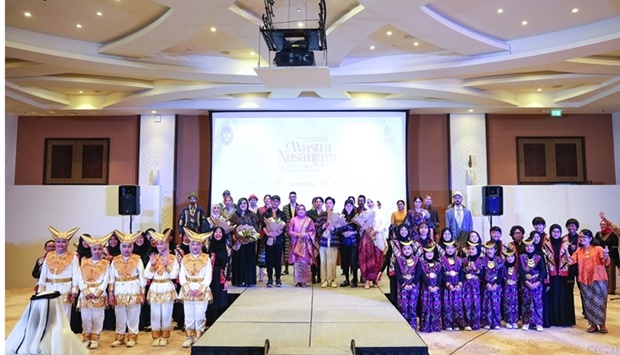* ‘Wastra Nusantara’: The Journey to Indonesian Fashion was held recently
The Indonesian embassy in Qatar held a one-of-its-kind fashion show and exhibition recently (October 30-31), titled ‘Wastra Nusantara’: The Journey to Indonesian Fashion, featuring the creative works of three renowned Indonesian designers.
More than 100 visitors, mostly fashion enthusiasts in the country, as well as ambassadors from different embassies and other guests, attended the event. The aim was to promote Indonesian fashion with traditional fabric as an important element in it.
Indonesian fashion designers Mel Ahyar, Danjyo Hiyoji, and Eridani, supported by Citra Tenun Indonesia and Rumah Tenun – the entities that have been preserving and promoting Wastra Nusantara – showcased the beauty of their works by creatively combining various traditional fabrics into their designs.

Works by three renowned Indonesian fashion designers take centre stage at the event.
“Wastra Nusantara (meaning “Fabrics from Indonesian Archipelago”) is one of the cultural treasures that have a special place in Indonesia. The term wastra itself is another name of traditional Indonesian fabric that is very conditional in meaning. Each region has a distinctive wastra, be it from the materials used, motifs, colours, and also its size,” Indonesian ambassador Ridwan Hassan said.
He noted that Indonesia, as an archipelagic country, is blessed with various different traditional fabrics and textiles have always been important in the archipelago (“Nusantara”). Up to this day, Indonesia’s vast range of fabric has shaped its identity nationally and internationally.
Mel Ahyar presented her collection “Kawin Campur 2.0” (mixed marriage 2.0 in English), combining several woven motifs from various Indonesian regions into one form and look. It portrays harmony, peace, and unity in diversity.
Danjyo Hiyoji’s “Temu”, read as Titik Temu (meeting point) also combines the best weaving fabrics from various regions in Indonesia into a design that is wearable, modern, and youthful.
Eridani showcased his utilisation of naturally dyed and traditional loom handcrafted fabrics, displaying the richness of Indonesian fabrics that blend into modernity and a fast-paced urban lifestyle.
Hassan said that in Indonesia, fabrics are produced more than just for practical needs – holding a ritual significance to those that exceed fulfilling day-to-day requirements.
“Fabrics tell stories and personalities in each choice of materials, in each dye used, in each design and pattern they bear. They were all different, but they reflect the faces of Indonesia in their own way.
“At this point, we realised that unveiling the significance of fabrics, garments, clothes – fashion in Indonesia means retelling what might be an endless story that shaped our country, our community. This should mark the beginning of our trip back to study all the differences, all the meanings of the small details in the history of cloths which are exclusively and diversely ours to remind ourselves of who we are,” the envoy added.
The event concluded with a talk discussing Indonesian fabrics used in contemporary fashion industry in Indonesia, in addition to a “meet and greet” with the designers.

